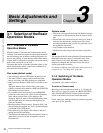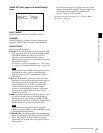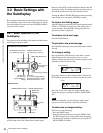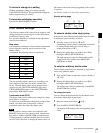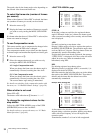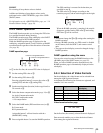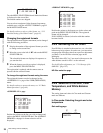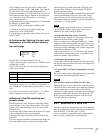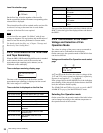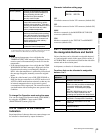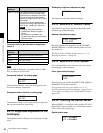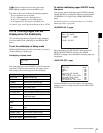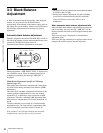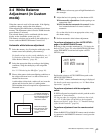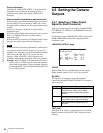
37
Basic Settings with the Subdisplay
Chapter 3 Basic Adjustments and Settings
At 1 on the first line, the gain value is selected from
among the following: –6 dB, –3 dB, 0 dB, 3 dB, 6 dB, 9
dB, and 12 dB. The corresponding ISO sensitivity is
displayed in parentheses. For
2 on the first line, you can
select either dynamic range or latitude for the indication
(see “Indications of the ISO sensitivity and dynamic
range” mentioned later).
On the second line, the color temperature is selected from
TUNGSTEN or DAYLIGHT.
With DAYLIGHT, electrical gain of 5600K is ON.
At shipment, the gain is set to 0 dB, and the color
temperature is set to TUNGSTEN.
The white balance adjustment value is fixed at the preset
value (3200K).
In Custom mode: Selecting the gain, color
temperature, and white balance memory
Gain setting page
The first line is in common with Cine mode.
At
3 on the second line, electrical gain of 5600K can be
switched ON or OFF.
At
4 on the second line, the white balance adjustment
value can be selected.
At shipment, the gain is set to 0 dB, color temperature is
set to 5600K-OFF, and the white balance memory is set to
W:P.
For details on white balance adjustment, see “3-4 White
Balance Adjustment (in Custom mode)” (page 43).
Indications of the ISO sensitivity and
dynamic range
The ISO sensitivity value displayed on the Gain setting
page is defined as “the value with which the video input
becomes 20% when shooting a gray-scale chart of 18%
reflection rate.”
Note that the video output value with respect to this input
will vary depending on the selected gamma.
Either dynamic range or latitude can be selected for the
indication.
The value displayed with % as a dynamic range shows the
limit on the high-luminance side in percentage (100%=
input level) in a case where the white of the gray scale
provides 100% (700 mV) output with the ITU-R709
gamma (standard gamma).
The value displayed with E as a latitude shows the latitude
on the high-luminance side by an f-stop value, using a
gray-scale chart of 18% reflection rate as the key light.
The gradation at the low-luminance side can be reproduced
up to approx. –6.5 stop at 0 dB.
As the dynamic range indication shows a value for the
input video, the dynamic range of the output video is
limited by the output settings as follows:
• If a gamma other than S-LOG is selected
The upper limit is clipped according to the output video
limitation specified by the gamma setting.
When you select a curve as Hyper Gamma No. 4, which
compresses 460% input to 109%, the output video is fed
within the range up to 460% of input video even if 800%
is displayed on the subdisplay as the dynamic range as the
output video is limited to 109%.
Using CvpFileEditor V4.1, you can change the dynamic
range of Hyper Gamma and create a user gamma curve
having no dynamic range limitation.
• If the white clip function is in use
As the white clip function limits the level of output video,
the dynamic range specified for the input video may not be
obtained for video output.
• If “Select FPS” is ON and Compensation is in Gain
mode
The value of the dynamic range may decrease by up to half
at maximum, depending on the FPS settings.
Why the ISO sensitivity is defined for 20% input
Defining the level of gray scale of 18% reflection rate for
the ISO sensitivity on the linear curve (defining with input
signal) permits you to use the values as the absolute
reference for proper gamma conversion in postproduction.
In addition, defining the output for 20% input with ITU-
R709 so that it becomes the reference code for Cineon
curve allows high compatibility.
3-2-7 Selection of a Lens File
With this camera, the compensation data for the mounted
lens can be adjusted in Custom mode and registered in the
built-in memory in lens files (max. 32 files).
You can invoke the compensation data for the mounted
lens by merely selecting the corresponding file.
Setting Adjustment value
W:P Preset value (3200K)
W:A The value stored in memory A
W:B The value stored in memory B
0dB(450) 800%
5600K-ON W:P
34
Note
Memo




